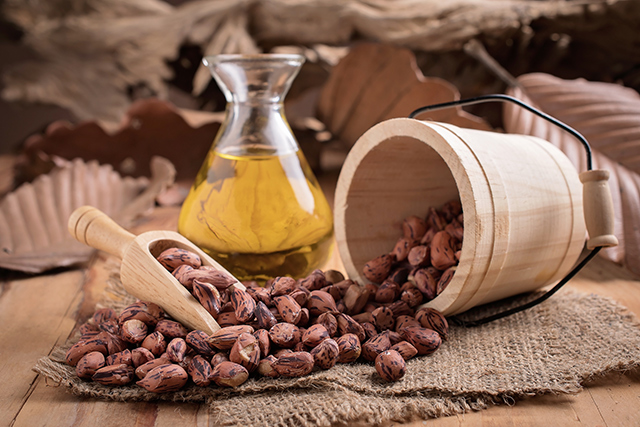
Peanut oil, derived from the humble peanut (Arachis hypogaea), is more than just a staple in many kitchens – it's a superfood with a rich history and versatile culinary applications. Extracted through either cold-pressing or refining methods, peanut oil boasts a mild, nutty flavor that can enhance dishes while also providing essential fatty acids.
But beyond its culinary appeal, is peanut oil actually good for you? How does it compare to other cooking oils and are there potential health risks to consider?
Brief history of peanut oil
Peanuts, native to South America, have been cultivated for thousands of years. But peanut oil did not gain widespread popularity until the late 19th and early 20th centuries, when industrial extraction methods made large-scale production viable.
In the U.S., agricultural scientist George Washington Carver played a key role in promoting peanuts -- and by extension, peanut oil -- as an alternative crop to cotton. This innovation helped establish peanut oil as a cooking staple in home kitchens and commercial food production. Today, major producers include China, India, the United States and Nigeria.
Nutritional profile of peanut oil
Unlike whole peanuts, peanut oil does not provide protein, fiber or significant amounts of vitamins (except vitamin E) and minerals, so it is not as nutrient-dense as flaxseed oil or extra virgin olive oil. But peanut oil is rich in beneficial fats like oleic acid that are known to support a healthy heart. Compared to other oils like coconut oil or palm oil, peanut oil is also low in saturated fats.
Here's what you can get from one tablespoon of peanut oil:
With its high levels of heart-healthy MUFAs and PUFAs, peanut oil can help you maintain healthy cholesterol levels when used in moderation. Unlike extra virgin olive oil, peanut oil is ideal for high-heat cooking like frying and stir-frying due to its high smoke point (~450 F). Additionally, its neutral yet slightly nutty taste makes it suitable for dressings, marinades and baked goods.
Is peanut oil healthy or harmful?
The health impact of peanut oil depends on factors like sourcing, processing and individual dietary needs.
On the positive side, peanut oil has a more favorable lipid profile compared to other fat-rich oils, making it a healthier, more cardiovascular-friendly alternative to butter or lard. It is also typically non-GMO and gluten-free, making it suitable for people with gluten sensitivities. Additionally, its high smoke point makes it an excellent cooking oil that won't produce harmful compounds when heated.
However, like many vegetable oils, peanut oil is high in omega-6 fatty acids and excessive consumption, without balancing with omega-3s, may contribute to inflammation. Highly refined peanut oil also doesn't contain as much antioxidants as minimally processed peanut oil, and may contain chemical residues from processing. People with severe peanut allergies should also exercise caution due to possible cross-contamination risks. (Related: Scientists develop breakthrough treatment in children with peanut allergies.)
But as long as you're not allergic to peanuts and maintain a balanced diet that includes rich omega-3 sources like flaxseed and fatty fish, peanut oil can be a healthy addition to your meals.
Why choose organic peanut oil
Peanut crops are prone to fungal contamination and peanut oil from conventionally grown peanuts may contain traces of glyphosate, organophosphates or fungicides, raising concerns about their safety.
Some studies have also detected low levels of heavy metals like arsenic and cadmium in peanuts, especially those grown in contaminated soil. To minimize you exposure to these harmful chemicals, opt for organic, cold-pressed peanut oil, which is not only minimally processed but also free of synthetic pesticides.
You should also look for third-party certifications (like USDA Organic or Non-GMO Project Verified) to ensure higher quality and cleaner products.
Culinary uses of peanut oil
Here are some delicious ways to incorporate peanut oil into your diet:
High-heat cooking
Flavorful recipes
Pro tip: For a richer taste, try unrefined (roasted) peanut oil as a finishing drizzle over noodles or grilled veggies.
This story is not medical advice and is not intended to treat or cure any disease. Always consult with a qualified naturopathic physician for personalized advice about your specific health situation or concern.
Visit NaturalNews.com, a great article source where you can learn about superfoods and their health benefits.
You can also try Brighteon.ai, an AI model created by Mike Adams, also known as the Health Ranger. This model is available as a free download to be run locally and is designed to help share and decentralize knowledge. By doing so, it aims to bypass censorship and empower people with knowledge.
If you're looking for an uncensored video free speech website where you can openly discuss nutrition, natural medicine, ingredients and more, check out Brighteon.com and our two free speech social media sites, Brighteon.IO and Brighteon.social.
Watch this video to learn how peanut oil is made inside a factory.
This video is from the Daily Videos channel on Brighteon.com.
More related stories:
Three ways to enjoy healthy, natural peanut butter.
4 Benefits of eating natural peanut butter before bed time.
How the peanut allergy epidemic was fueled by faulty science and institutional arrogance.
Sources include:
Brighteon.AI
NaturalNews.com
Brighteon.com
Source link

